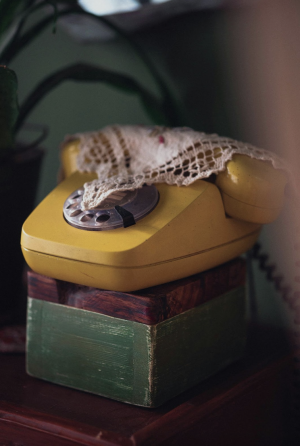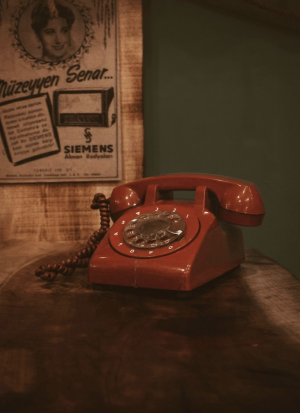Ditching Smartphones? Why Gen Z is Going ‘Retro’ with Landline Calls
- Replies 14
In a surprising twist of generational preferences, the younger generation, born between 1997 and 2012, are embracing a technology that many thought was on the brink of extinction – the landline phone.
A greater interest in the culture and technology of the early 2000s is contributing to this trend.
As a result, the younger generation have garnered attention for switching to flip phones, turning iPod Minis into hair ornaments (yes, you read that correctly!), and searching internet marketplaces for ‘vintage’ iPods from 2007, including utilising landlines again.
So, why are they, who grew up in homes possibly without a landline, suddenly enamoured with this seemingly outdated technology?
The New York Post reports that the corded landline phone is the latest target of the younger generation's retro-tech fascination. This comes at a time when landlines are becoming increasingly rare, with the Australian Communications and Media Authority reporting in 2022 that 63% of Australians only use a mobile for phone calls at home.
The answer lies in the nostalgia and romanticism associated with the early 2000s. Nicole Randone, a 24-year-old told The Guardian, 'One of my first memories is the tan landline my parents had mounted to the kitchen wall. I always fantasised about the day I’d have one in my own room.'
She added, 'Having a landline bridges that gap between reality and my childhood fantasy. I feel like the main character in my favourite TV shows when I use it.'
With its cord and physical buttons, the landline phone is a tangible link to a time before smartphones dominated our lives.
It symbolises a slower, simpler era when communication was more personal and less instantaneous. For those who have grown up in a world of constant connectivity and digital overload, the landline offers a refreshing break from the norm.
Sam Casper, aged 27, owns a light pink Crosley landline, which she uses to talk to her friends.
She told The Guardian, 'It’s so cute and romantic. It’s very Sex and the City, so we started doing it. I loathe mobile phones because everyone cancels at the last minute through text, which I find absurd.'
The Rise and Fall (and Rise Again) of the Landline
The landline telephone was once a staple of every household. Invented in the 19th century, it revolutionised communication, allowing people to talk to each other across vast distances. By the mid-20th century, the landline symbolised modernity and progress.
However, with the advent of mobile phones in the 1980s and 1990s, the landline began to lose its relevance.
Mobile phones offered greater convenience and flexibility, allowing people to make and receive calls anywhere. As mobile technology improved and prices dropped, more and more people began to abandon their landlines.
By the 2000s, the landline was seen as outdated and unnecessary. Many people, particularly younger generations, saw no need for a landline when they could do everything on their mobile phones.
But now, the landline is making a comeback in a surprising turn of events. Many people, tired of smartphones' constant connectivity and distractions, are rediscovering the simple pleasure of a landline call.
So, it might be time to dust off that old landline phone, after all, everything old is new again.

What do you think, members? Do you still have a landline at home? Would you consider getting one again? Share your thoughts in the comments below! We’d love to know what you think of all of this!
A greater interest in the culture and technology of the early 2000s is contributing to this trend.
As a result, the younger generation have garnered attention for switching to flip phones, turning iPod Minis into hair ornaments (yes, you read that correctly!), and searching internet marketplaces for ‘vintage’ iPods from 2007, including utilising landlines again.
So, why are they, who grew up in homes possibly without a landline, suddenly enamoured with this seemingly outdated technology?
The New York Post reports that the corded landline phone is the latest target of the younger generation's retro-tech fascination. This comes at a time when landlines are becoming increasingly rare, with the Australian Communications and Media Authority reporting in 2022 that 63% of Australians only use a mobile for phone calls at home.
The answer lies in the nostalgia and romanticism associated with the early 2000s. Nicole Randone, a 24-year-old told The Guardian, 'One of my first memories is the tan landline my parents had mounted to the kitchen wall. I always fantasised about the day I’d have one in my own room.'
She added, 'Having a landline bridges that gap between reality and my childhood fantasy. I feel like the main character in my favourite TV shows when I use it.'
With its cord and physical buttons, the landline phone is a tangible link to a time before smartphones dominated our lives.
It symbolises a slower, simpler era when communication was more personal and less instantaneous. For those who have grown up in a world of constant connectivity and digital overload, the landline offers a refreshing break from the norm.
Sam Casper, aged 27, owns a light pink Crosley landline, which she uses to talk to her friends.
She told The Guardian, 'It’s so cute and romantic. It’s very Sex and the City, so we started doing it. I loathe mobile phones because everyone cancels at the last minute through text, which I find absurd.'
The Rise and Fall (and Rise Again) of the Landline
The landline telephone was once a staple of every household. Invented in the 19th century, it revolutionised communication, allowing people to talk to each other across vast distances. By the mid-20th century, the landline symbolised modernity and progress.
However, with the advent of mobile phones in the 1980s and 1990s, the landline began to lose its relevance.
Mobile phones offered greater convenience and flexibility, allowing people to make and receive calls anywhere. As mobile technology improved and prices dropped, more and more people began to abandon their landlines.
By the 2000s, the landline was seen as outdated and unnecessary. Many people, particularly younger generations, saw no need for a landline when they could do everything on their mobile phones.
But now, the landline is making a comeback in a surprising turn of events. Many people, tired of smartphones' constant connectivity and distractions, are rediscovering the simple pleasure of a landline call.
So, it might be time to dust off that old landline phone, after all, everything old is new again.
Key Takeaways
- Gen Z embraces ‘vintage items’ from the early 2000s, showing a trend towards using corded landline phones for their communication.
- Despite the decline of landline use, with young Australians likely to only have mobile phones, Gen Z's fascination with ‘retro’ tech might lead to a resurgence in landline use.
- Nostalgia for the 2000s and the aesthetic appeal of using items portrayed in TV shows from that era are driving factors for Gen Z's interest in landlines.
- Gen Z's adoption of old trends is not limited to technology; they also revive the '90s and early 2000s fashion trends, contributing to a broader pattern of reclaiming past styles.
What do you think, members? Do you still have a landline at home? Would you consider getting one again? Share your thoughts in the comments below! We’d love to know what you think of all of this!









